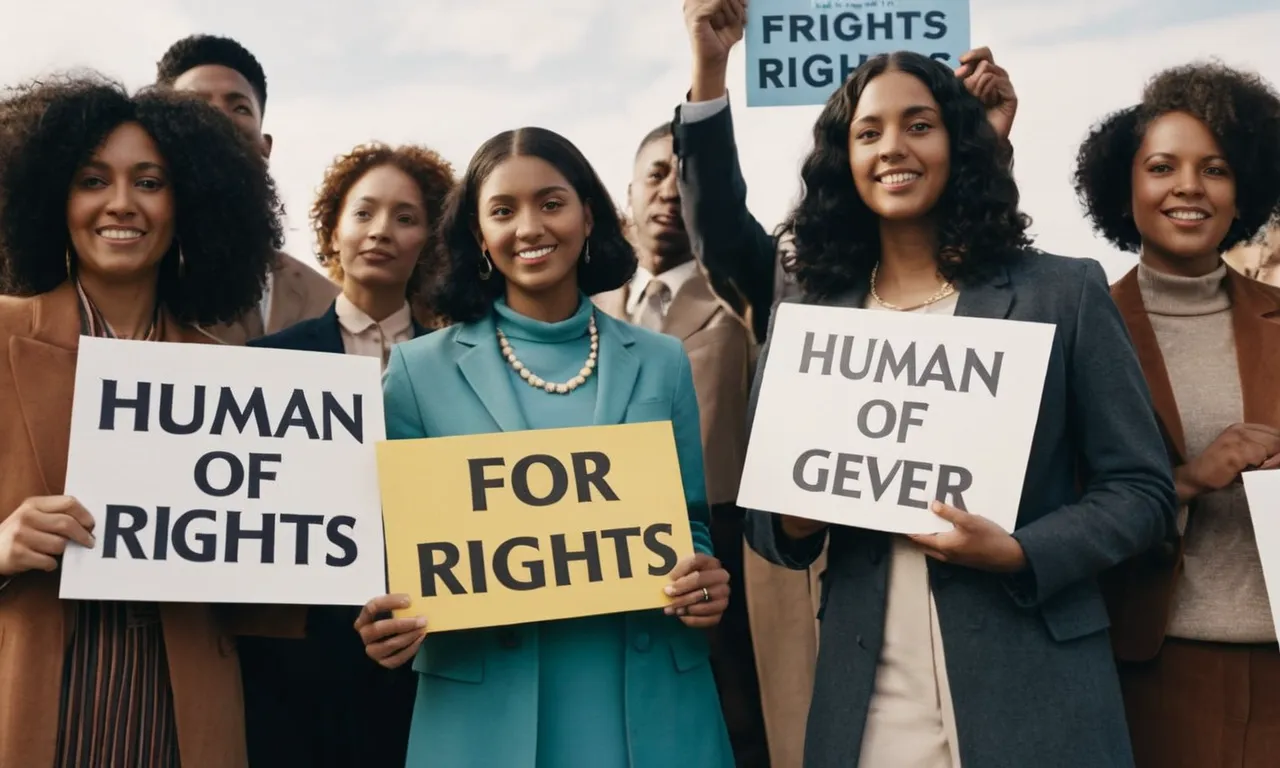What Are God Given Rights?
The concept of god given rights has been debated for centuries. At its core is a fundamental question: do human beings have innate rights bestowed upon them by a divine Creator, or are rights simply constructs of human governments and society?
This discussion strikes at the very heart of moral and political philosophy.
If you’re short on time, here’s a quick answer to your question: God given rights refer to fundamental human rights that are believed to be bestowed upon all people by God or a supreme being, rather than given by governments or society.
These often include rights to life, liberty, and the pursuit of happiness.
In this comprehensive article, we will dive deep into the history, philosophy, and politics surrounding the idea of god given rights. We’ll explore where the concept originated, different perspectives on what constitutes a god given right, and how the idea has influenced government and moral thinking over the centuries.
The Origins and Early History of God Given Rights
Classical Antiquity and Early Religious Views
The concept of natural or God given rights has its roots in classical antiquity. Ancient Greek philosophers like Aristotle spoke of natural justice and natural right existing apart from human laws and institutions.
Many early religious traditions also incorporated ideas about divine moral codes or God given liberties. For example, the Code of Hammurabi (1754 BCE) invoked the authority of the Babylonian gods. In ancient India and China, religious duties and cosmic order were seen as emanating from a universal, divine source.
The Bible and Judeo-Christian Tradition
The Judeo-Christian tradition was extremely influential in the development of natural rights theory in the West. Biblical passages reference universal moral laws and suggest all people have inherent worth as creations made in God’s image.
Later Jewish philosophers such as Maimonides spoke of divine law granting freedom and intellectual inquiry. Christian thinkers like the philosopher Thomas Aquinas wrote of an eternal divine law that gives rise to natural rights that apply to all humankind.
Protestant Reformation leader John Calvin also stressed natural human equality and liberty as part of God’s plan. He argued for institutional checks on government power to prevent infringement on divinely-given freedoms and privileges.
For example, Calvin praised elements of democracy and constitutionalism for their ability to disperse authority and safeguard God given rights.
Philosophers on Natural Rights and Law
In the 17th and 18th centuries, prominent Enlightenment philosophers expanded on religious natural rights traditions and helped secularize concepts of inherent liberties grounded in a non-denominational “natural law.
“ Thinkers like Hugo Grotius, John Locke and Thomas Hobbes wrote of self-evident rights and freedoms possessed by all human beings and governments’ duty to uphold liberties bestowed by God or nature.
While differing on important points, these political philosophers agreed certain core civil rights – like life, liberty, private property and self-defense against tyranny – were divinely ordained or intrinsically human.
Locke was especially influential, with his vision profoundly shaping the founders’ view of natural rights and social contract theory underlying American constitutional government.
Key God Given Rights in Political Thought
The Right to Life
The right to life is considered an inalienable human right bestowed by the Creator. It forms the foundation for all other natural rights. Without the right to life, other rights would be meaningless.
Many Founding Fathers of the United States, like Thomas Jefferson and John Adams, emphasized the importance of the right to life in the Declaration of Independence. They stated that all people are “endowed by their Creator with certain unalienable Rights, that among these are Life, Liberty and the pursuit of Happiness.”
This right to life protects individuals from being killed arbitrarily. It is intimately connected to the right of self-defense against lethal threats. The state has an obligation to defend and preserve human life through rule of law.
The Right to Liberty
Liberty refers to personal freedom from arbitrary government interference. It enables people to think, speak, work, associate and worship freely based on their choices.
The right to liberty was crucial for Founding Fathers like Thomas Jefferson. He stated in the Declaration of Independence that all humans are endowed with certain unalienable rights including “Liberty.” This upholds human dignity.
Human liberty requires limits on state power. A key aim of the US Constitution is to defend citizens against excessive government control over thoughts, speech and actions. Liberty and self-government are deeply interdependent.
The Pursuit of Happiness
The phrase “pursuit of happiness” in the Declaration of Independence refers to the right of citizens to freely pursue productive, meaningful activities that bring personal fulfillment and joy according to their own values and priorities.
This right seeks to protect individuals’ ability to improve their condition through talents and hard work. It is connected to having opportunities for advancement through economic and social liberty.
In a 2005 legal case, a U.S. Court of Appeals ruled that the Constitution does not guarantee happiness itself. However, it does promote a society where individuals have the freedom to strive for long-term happiness and self-actualization.
God Given Rights in the Founding of America
The Declaration of Independence
The Declaration of Independence, written in 1776, lays out the founding principles of the United States built upon the idea that all people have God-given rights to life, liberty, and the pursuit of happiness.
Thomas Jefferson wrote that people are “endowed by their Creator with certain unalienable Rights.” This belief was central to the American Revolution and founding of the nation. The colonists argued that the British government was infringing upon rights given to them by God, which justified declaring independence.
The Declaration states these truths are “self-evident” and that “Governments are instituted among Men, deriving their just powers from the consent of the governed.” This enshrined the consent of the people as the source of governmental power rather than a monarch.
Overall, the Declaration of Independence established that God-given individual rights are fundamental to the American system of government.
Debates Among the Founding Fathers
There were extensive debates among the Founding Fathers about the role of God and religion in the new American government. Thomas Jefferson, author of the Declaration of Independence, advocated strongly for separation of church and state.
In his 1802 letter to the Danbury Baptists, he wrote of the need for a “wall of separation between Church & State.” On the other side, John Adams argued that morality and virtue grounded in religion were essential to a functioning republic.
Adams stated that, “We have no government armed with power capable of contending with human passions unbridled by morality and religion.” Alexander Hamilton also argued that faith was necessary to support free government.
Overall there was disagreement among founders like Jefferson, Adams, and Hamilton about the exact relationship between religion and state, but general agreement that God-given rights underpin the entire enterprise.
The US Constitution and Bill of Rights
While the Declaration of Independence invoked God-given rights, the United States Constitution purposefully made no mention of a deity or religion, neither promoting nor prohibiting its free exercise.
However, the First Amendment states “Congress shall make no law respecting an establishment of religion, or prohibiting the free exercise thereof.” This prevented the federal government from creating or interfering with religious practice.
The Constitution gave power to the people with no appeal to a higher power. However, the Bill of Rights reflected the founder’s views on natural rights given by God that governments should not infringe upon.
The Ninth Amendment states that the enumeration of certain rights should not be construed to deny others retained by the people. This again enshrined the idea of God-given rights that existed even before their constitutional guarantee.
So while the Constitution itself made no mention of God, the underlying idea of innate God-given rights is reflected in the Bill of Rights limiting the power of government over the people.
Criticisms and Counterarguments on God Given Rights
Secular and Atheist Views
Those with secular or atheist worldviews may critique the concept of God-given rights in a few key ways. First, they may argue that rights originate from human reason and ethics rather than any divine authority (Stanford Encyclopedia of Philosophy).
Second, they may point out that different religions and cultures have differing perspectives on rights, undermining the idea of universal God-given rights (The Cambridge Companion to Human Rights Law).
Finally, they may highlight examples in history where religious arguments were used to justify oppression and violations of human dignity.
Utilitarian Perspectives
Utilitarians judge actions based on whether they maximize happiness and well-being for the greatest number of people. From this view, rights must be justified based on their contribution to human welfare, not divine commands.
Utilitarians may argue that God-given rights sometimes fail to achieve the greatest good. For example, an absolute right to property could allow some to hoard resources while others starve (Stanford Encyclopedia of Philosophy).
Instead, they propose judging rights claims on a case-by-case basis based on outcomes. However, there are also compatibility arguments: belief in God-given dignity can motivate care for the poor. Overall there is room for debate around whether God-given rights align with utilitarian aims.
Rights As Social Constructs
Social constructivist views see rights as products of social processes and agreements rather than divine gifts or inherent attributes. On this view, rights emerge gradually within particular cultural contexts, shaped by changing norms and institutions (Stanford Encyclopedia of Philosophy).
What people see as “God-given” often reflects social conventions of their time and place rather than eternal truths. For example, views on rights of women and minorities have changed drastically. However, others counter that widespread belief in rights’ higher origins, across times and cultures, indicates these convictions answer a profound human need.
The Legacy and Impact of God Given Rights Today
Human Rights Advocacy
The concept of God-given rights has had a profound influence on human rights advocacy. Many activists and organizations root their calls for justice, equality, and human dignity in the idea that all people have intrinsic rights bestowed by God or a divine power.
For instance, the founders of Amnesty International and many members were inspired by their religious faith to take a stand against oppression and cruel punishment. In the United States, the civil rights movement led by Dr. Martin Luther King Jr. was fueled by the belief that segregation and racism violated God-given rights.
He famously declared, “We will win our freedom because the sacred heritage of our nation and the eternal will of God are embodied in our echoing demands.” This moral conviction continues to spur efforts around the world to protect human rights.
Moral and Political Theory
The concept of natural or God-given rights has profoundly impacted moral and political philosophy. Enlightenment thinkers like John Locke and Thomas Jefferson grounded their theories of natural rights in the belief that human beings are endowed by their Creator with inherent rights and liberties.
This reasoning was very influential on the Declaration of Independence and provided moral justification for overthrowing British rule. In contemporary times, heated debates continue between advocates of natural law theory who argue that moral truths and human rights are grounded in a higher divine authority, and critics who believe rights emerge from social contracts or other secular sources.
For example, the U.N. Universal Declaration of Human Rights traces human rights to the “inherent dignity” and “equal and inalienable rights of all members of the human family.” This language echoes the natural rights tradition without explicitly invoking divine origins.
Ongoing Controversies and Debates
Appeals to God-given rights remain controversial in political discourse. Critics argue this unproven religious assumption should not determine policy or law in a pluralistic society. Supporters counter that the concept of innate human dignity and equality is still useful even without the theological claims.
For example, in recent US Supreme Court cases about LGBTQ rights, dissents argued same-sex marriage bans protected “moral convictions rooted in decent and honorable religious or philosophical premises,” while the majority opinions emphasized the fundamental “liberty and equality” of all citizens.
The dissent reflects one view of divine moral law, while the majority focuses on equal rights. These clashes reveal deep divides persisting today. Nonetheless, belief in God-given rights continues to motivate many civic and faith groups to fight for social reforms consistent with their moral values.
Conclusion
The concept of god given rights has profoundly impacted moral and political thought since ancient times. While perspectives differ greatly on whether universal human rights are endowed by a Creator or simply human constructs, the notion of innate, inviolable rights remains a compelling idea that underlies modern society.
As mankind continues to grapple with moral, ethical and governance challenges, the philosophical origins and impact of god given rights will likely continue as an integral, if contentious, part of the dialogue.








